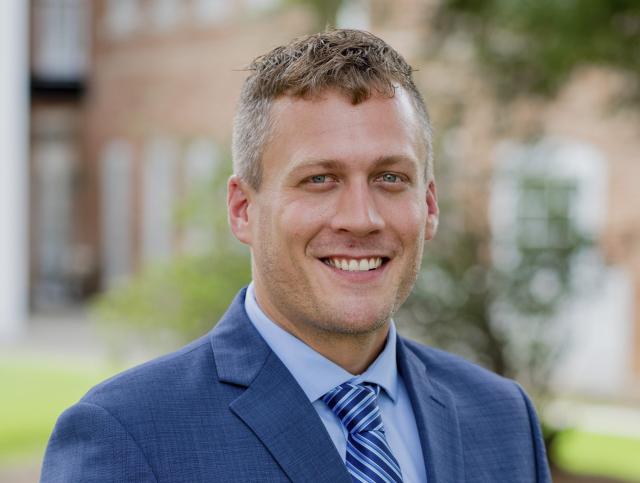Kean Research Q&A: Faculty Researcher Joshua Guitar, Ph.D.

Joshua Guitar, Ph.D., is an assistant professor in the Department of Communication, Media and Journalism at Kean University. Guitar, who received Honorable Mention for the Faculty Research Mentor of the Year Award at Kean’s 2024 Research Days, teaches courses in rhetoric, critical media studies and political communication. Guitar spoke with Kean Research about his research on political rhetoric, critical theory, democracy and whistleblowing.
Q. What are the major issues in your research area?
At the core of my research, I study how democratic ethics are either actualized or inhibited within the public forum. More specifically, I examine how concepts like freedom/liberty and equality/equity are negotiated in mediated discourse. As a critical rhetorician, I often explain how ideological demarcations like race, gender and culture inconspicuously inform anti-democratic power relations.
Q. In one sentence, what is the most important question you want to address?
I seek to expose how seemingly inadvertent elements of communicative practices inform processes of oppression or liberation.
Q. What has been the impact of your research?
I have focused much of my research on individual agents of democracy, like truth-tellers and whistleblowers, arguing that they typify democratic citizenship through their use of free expression to expose political inequalities and infringements of civil liberties. In doing so, I have developed an analytical model that assists us in understanding how, despite increased public attention to a particularly disconcerting problem, we rarely see substantial reforms.
Q. What is the state of political discourse in 2024? What can be done, or what can an individual do, to make a difference?
We are certainly living through one of the more contentious political cycles in recent history. The caustic nature of the discourse can often leave us disenchanted with politics, especially during an election year when we are inundated with political messaging. Despite this reality, I encourage everyone to actively engage in the political process, and that they should recognize that this extends well beyond casting ballots in national elections. Although national elections matter, so too do state and local elections. Even more important, however, is the political discourse that occurs between elections.
We often think of democracy as simply voting, but it is much more than this. Democracies move forward through everyday discourse where we grapple with current concerns. Making our voices heard in these processes is paramount, especially as we have the potential to influence our friends, family and peers. So, while it can be hard to measure our political influence, it is important to think about democratic citizenship as an everyday activity because, in the end, we are tasked with ensuring we advance the ideas of freedom and equality for ourselves. In that, our voices always matter.
Q. Kean is the state’s urban research university. Does your research serve urban communities?
Absolutely. Although the implications of my research apply across society, they are particularly salient in urban communities where political struggles often manifest rather fiercely.
Q. Kean is focused on developing collaborations among departments. What opportunities for multi-disciplinary work does your research offer?
I love collaborating with the brilliant faculty across campus. I have numerous ongoing projects with some remarkable colleagues of mine both within my department and outside my department. All of these collaborations excite me, but in the spirit of the question, I am driven by interdisciplinary research/creative partnerships because they foster multifaceted responses to complex social problems.
Because I broadly study how communication practices and discourses reveal manifestations and negotiations of ideological power, my research interests are especially conducive to multidisciplinarity. Outside of my department, my scholarship can align well with scholars in fields like psychology, sociology, history, languages, and political science, to name a few.
Q. What advice would you give to a new researcher about working with students on research?
My advice: Do not hesitate to work with students. We are doing a disservice to our students and to the driving ethos of academia if we reduce our relationships with students to mere transactions. Students not only have the ability to assist with the complexities of rigorous academic research, they are also enthusiastic about learning the processes and helping. To be successful research partners, most students simply need someone who believes in them.
I love collaborating with the brilliant students across campus. I have co-authored and co-presented multiple studies with some amazing Kean students and continue to work with some on our campus. Although I function as principal investigator in my research projects with them, I approach the students as equal partners. Students serve as co-investigators and co-authors, assisting in every stage of the process. Through it all, students never cease to amaze me, and, most importantly, these partnerships help students actualize themselves not just as recipients of information in the classroom, but as active citizen-scholars of academia.
Q. How has being a member of the Kean faculty enhanced your work?
I love that Kean University is nurturing an environment that supports the creative work and research of our students and faculty. I cannot thank enough the people who have already supported my work (and the paperwork that goes with it) from across campus, like in the offices of the Office of Research and Sponsored Programs, the Center for Undergraduate Research and Fellowships, the Office of Academic Affairs, the College of Liberal Arts, and the Communication, Media and Journalism Department.